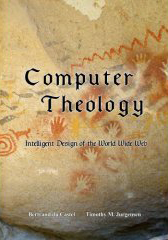PRESS
 |
COMPUTER THEOLOGY |
||||
|
Likewise, one can always sue someone else,
except as we noted in Chapter 1, government and God. Discounting these
exception cases, this approach to consequences brings recursion to a high art
form. Therefore, with these many trust-inducing mechanisms in mind, in the following chapter we will consider some of the characteristics of a hypothetical mutational event that might provide an inherently trusted platform from which humans could project their presence into the world of computer-enabled interactions; a world that is often referred to as cyberspace. While the mechanism would not eliminate untoward consequences in interactions, it might well make their resolution more objective.
|
||||
|
||||
© Midori Press, LLC, 2008. All rights reserved for all countries. (Inquiries) The contents of ComputerTheology: Intelligent Design of the World Wide Web are presented for the sole purpose of on-line reading to allow the reader to determine whether to purchase the book. Reproduction and other derivative works are expressly forbidden without the written consent of Midori Press. Legal deposit with the US Library of Congress 1-33735636, 2007.
|
ComputerTheology Intelligent Design of the World Wide Web Bertrand du Castel and Timothy M. Jurgensen Midori Press, Austin Texas 1st Edition 2008 (468 pp) ISBN 0-9801821-1-5 |
Book available at Midori Press (regular) |